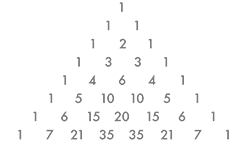
Project Euler 203: Find the sum of the distinct square-free numbers in Pascal's triangle.
Problem Description
The binomial coefficients nCk can be arranged in triangular form, Pascal’s triangle, like this:

It can be seen that the first eight rows of Pascal’s triangle contain twelve distinct numbers: 1, 2, 3, 4, 5, 6, 7, 10, 15, 20, 21 and 35.
A positive integer n is called square-free if no square of a prime divides n.
Of the twelve distinct numbers in the first eight rows of Pascal’s triangle, all except 4 and 20 are square-free.
The sum of the distinct square-free numbers in the first eight rows is 105.
Find the sum of the distinct square-free numbers in the first 51 rows of Pascal’s triangle.
Analysis
Only a few primes are required. For example, 51! is the biggest numerator (nCk = n! / k! (n-k)! ) and the largest prime factor required is ≤ √51 which is 7. You can add a few more to try bigger problems.
So we fill a set with distinct numbers from Pascal's triangle and iterate through the 614 binomial coefficients and track which ones are square-free, sum them up and print the results. I only wish my biometrics problems were this obvious.
Project Euler 203 Solution
Runs < 0.001 seconds in Python 2.7. Use this link to get the Project Euler 203 Solution Python 2.7 source.
Use this link to get the Project Euler 203 Solution Python 2.7 source.
Afterthoughts
-
No afterthoughts yet.

I think the number of binomial coefficients for 51 rows is 614, not 589. 589 would be the correct amount for 50 rows.
Nice solution apart from that.
Posted by fish | May 1, 2016, 7:28 PMWhoops! Thanks for catching that!
Posted by Mike Molony | May 16, 2016, 9:15 PM